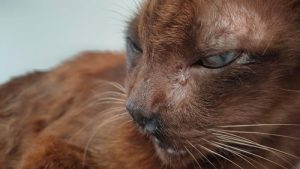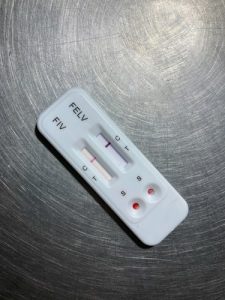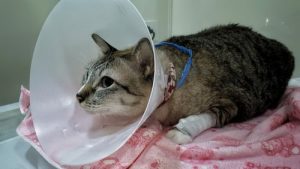Feline immunodeficiency virus is an incurable disease that affects the immune system of cats. The condition is more commonly diagnosed in middle-aged cats and is estimated to affect up to 4% of cats in the UK.
Feline immunodeficiency virus is commonly called FIV or is also known as feline acquired immune deficiency virus (AIDS). Cats catch the virus through direct contact with infected cats, usually through fighting and bites. There’s sadly no treatment for FIV, but infected cats can live normal, healthy, and long lives if the condition is managed appropriately.
Overview
What is feline immunodeficiency virus in cats?
Feline immunodeficiency virus belongs to a group of viruses that affect the immune system and can cause cancer in cats.
- FIV is spread through saliva, blood, and other secretions. Cats usually catch the virus through bite wounds from fighting.
- The virus can also spread through blood transfusions, or from a mother to her kittens, though this is not common.
- Close contact is needed for spread. The virus does not survive for long in the environment.
- Once infected, cats can’t get rid of the virus and remain infected for life.
- Cats can be infected at any age but we most commonly see symptoms begin around 5-10 years old.
- Cats diagnosed with FIV can live long and healthy lives if managed appropriately.
Feline immunodeficiency virus is a serious and incurable disease. If you suspect your cat is at risk or has any symptoms, speak to a vet as soon as possible. Our Joii Vets are available 24 hours a day for advice.
Symptoms
Symptoms of feline immunodeficiency virus in cats
The symptoms of feline immunodeficiency virus often take months or years to develop:
- Fever
- Lethargy
- Weight loss and reduced appetite
- Enlarged lymph nodes
- Diarrhoea, vomiting and other digestive problems
- Sore gums, runny nose and eyes
- Skin disease
- Recurrent and persistent infections of different types due to a compromised immune system
- Pale gums (due to anaemia – reduction in red blood cells)
- Cancer: different types, such as lymphoma

- Runny eyes and nose
Symptoms of FIV are similar to those of another virus in cats, feline leukaemia, and they are often tested for at the same time.
Risk
Are some cats more at risk of feline immunodeficiency virus than others?
- Un-neutered male cats
- Outdoor cats
- Cats that live with or in an area with a large cat population
Diagnosis
How is feline immunodeficiency virus diagnosed in cats?
Diagnosis of feline immunodeficiency virus is usually done through a blood test:
- An “in-house” blood test is usually quick and inexpensive
- More specialised blood tests may be sent to a special lab for confirmation
- Pregnant cats who are infected transfer antibodies to their kittens in the milk. This can lead to a false positive result in a blood test. A blood test when they are older than 6 months should be done to confirm.
- Cats who have been vaccinated abroad may also have a false result for certain blood tests

- In-house blood test
Other tests may be needed to diagnose secondary infections or cancer:
- Blood tests for the liver, kidneys and other organs
- Urine tests
- Swabs, fluid analysis or biopsies
- Imaging, such as x-rays or ultrasound
Vet treatment
What’s the treatment for feline immunodeficiency virus in cats?
Unfortunately, there is no way to predict how long cats will survive after diagnosis with FIV, but many cats live long and healthy lives. As feline immunodeficiency virus is incurable, treatment consists of managing the symptoms.
- Treatment of secondary infections. This may include antibiotics, eye drops, anti-inflammatory medications, and pain relief.
- Hospitalisation for monitoring if the symptoms are severe.
- Blood transfusions and other medications if they have anaemia.
- Treatment of cancer may include chemotherapy.

- Hospitalisation may be needed for extra care
Some medications may have some effect on the virus but have limited studies in cats
- Interferon and AZT
Home treatment
How to look after a cat with feline immunodeficiency virus at home
Cats diagnosed with FIV are infectious to other cats. They are also more prone to becoming ill due to a weakened immune system.
- Regular vet check-ups: at least twice a year for a full clinical exam
- Neutering your cat: reduces the risk of fighting with other cats
- Keep your cat up to date with parasite preventatives and vaccinations
- Diet: make sure they are on a well-balanced diet. Specific diets may be advised if they are losing weight or have other underlying conditions.
- Weight monitoring: keep an eye on their appetite, energy levels and weight regularly to make sure they are not losing weight.
- Access to a steamy room can be useful for cats with respiratory signs.
- Indoor lifestyle: keep your cat indoors where possible to prevent spread to other cats. If your cat is used to being outdoors, follow our guide on stress in cats for tips on how to help them adapt to indoor living. Keeping your cat indoors will also prevent access to other possible diseases that could make your cat ill. Building a secure run in the garden is a good way to keep them active and safe.
- Do not mix with other cats. Ideally, keep your cat in a household with no other cats. If there are other cats, keep infected cats separated from non-infected cats. If this is not possible, clean any bowls, litter trays, or toys with disinfectant before reusing them. Risk of spread through grooming or shared bowls can happen, but it’s not common.
Prevention
Tips on how to prevent feline immunodeficiency virus in cats
- The best way to prevent FIV is to keep your cat indoors or under strict supervision when outdoors.
- Test all household cats before introducing new cats or kittens to your house. It is advised to test any new cats too.
- Neuter your cat to reduce fighting with other cats.
- There is a vaccine available for FIV in some countries; however, it doesn’t cover all of the strains so it does not offer complete protection.
Is my family at risk of catching feline immunodeficiency virus?
FIV has many similarities to the human virus HIV. However, the virus is species-specific. FIV does not spread to humans or other species of animals, such as dogs.
When to worry
When should you be worried about feline immunodeficiency virus in cats?
Seek help from a vet if
- Your cat’s symptoms persist or worsen despite treatment
- New signs of illness develop
Call us and speak to one of our Joii Vets if
- You have any questions about balanced diets for your cat
- Your cat has mild vomiting or diarrhoea
- You have any questions about home treatment for feline immunodeficiency virus








